Does your Mask Work against Coronavirus?
By: Dr. Soroush Ghaffarpour
CP Lab Safety

With the COVID-19 pandemic in full swing,
people are wondering how effective masks are at preventing coronavirus
infections. On April 3rd, the
CDC issued guidelines urging Americans to wear cloth face
coverings in public and reserve medical grade surgical masks and N95
respirators for healthcare workers. Additionally,
several Bay Area counties announced a mandatory
requirement
on April 22nd to wear face coverings in public spaces,
enclosed buildings, and while conducting essential businesses. There is a
natural inclination to be skeptical regarding these recommendations, but what
does the science say on this topic?

Let’s look at the size of the coronavirus. Scientists have measured the diameter of the virus particle using electron microscopy. The virus spans approximately 125 nm (0.125 microns) and ranges between 60 - 140 nm. Some believe that this is too small for what an N95 mask is capable of filtering.
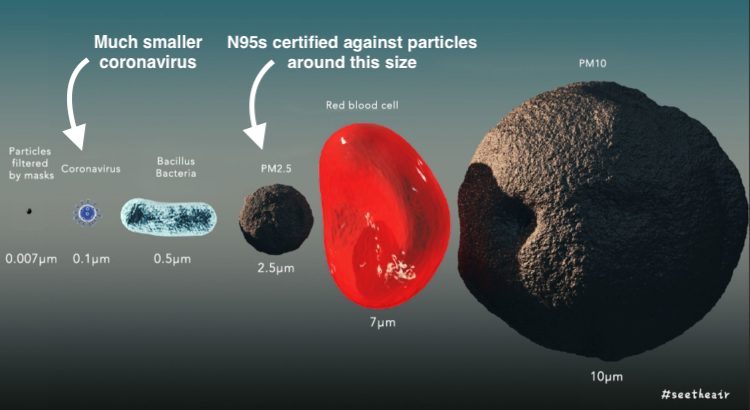
N95 respirators are tested by NIOSH to filter particles larger than 300 nm. Well we know that coronavirus is smaller than that, so one would think that even an N95 is not effective against a virus of this size. However, scientists have put this to the test.
In one study, scientists emitted car exhaust particles at different types of masks (shown in the image below). The particles were as small as 20 nm, which is approximately 5x smaller than the coronavirus. As seen in the table below, 3M N95s were able to filter out over 96% of the particles transmitted through the mask. Surgical masks performed surprisingly well, filtering out about 80% of the particles. A cotton handkerchief did not perform as well, only filtering out about 26% of the particles.

The previous study tested masks against car exhaust but are results different with viruses? In another study, scientists shot actual virus particles of varying sizes at the N95 respirator. The study also recorded two air flow rates to simulate breathing normally and breathing heavily. What they found is that the N95 captured more than 95% of the viruses, even those smaller than the size of the coronavirus.

Now, let’s address the topic of N95 respirators vs. surgical masks. Some argue that because of the poor fit with surgical masks, they are almost useless against protecting from viral infection. A study conducted on over 2,800 nurses disagrees with this common claim. The results showed no statistical difference between nurses wearing surgical masks vs. N95s for contracting the influenza virus.
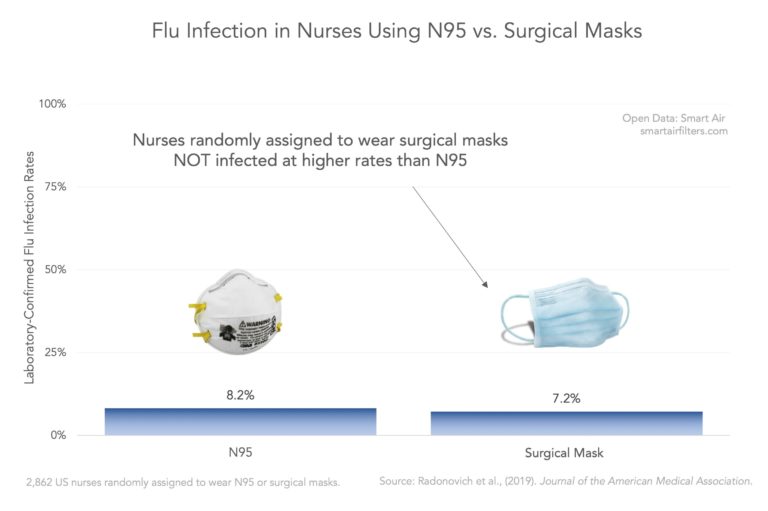
One issue with that study is a lack of a control - meaning we would want to see how wearing a surgical mask or N95 compares to wearing no mask at all. That poses a risk for nurses in a hospital setting. A study in Australia worked around this, testing these 3 groups (no mask, surgical mask, and N95) on parents taking care of sick children during flu season. The results showed no difference between surgical mask and N95s but wearing either mask decreased the probability of infection by 2x compared to no mask.
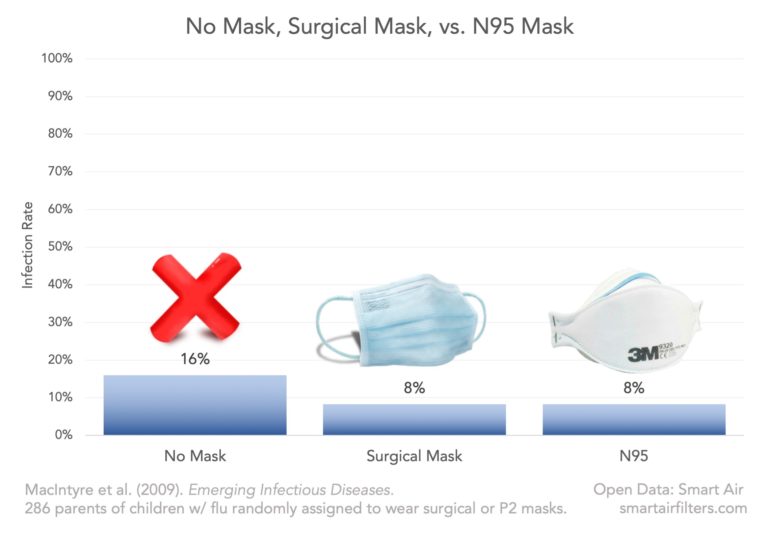
We’ve covered N95 respirators and surgical masks, now how about DIY cloth masks? The CDC recommends cloth masks for the public to maintain medical-grade masks for healthcare workers, but how do these masks perform? Researchers at Cambridge University compared cloth and surgical masks against a bacteria the size of coronavirus. These were the results:
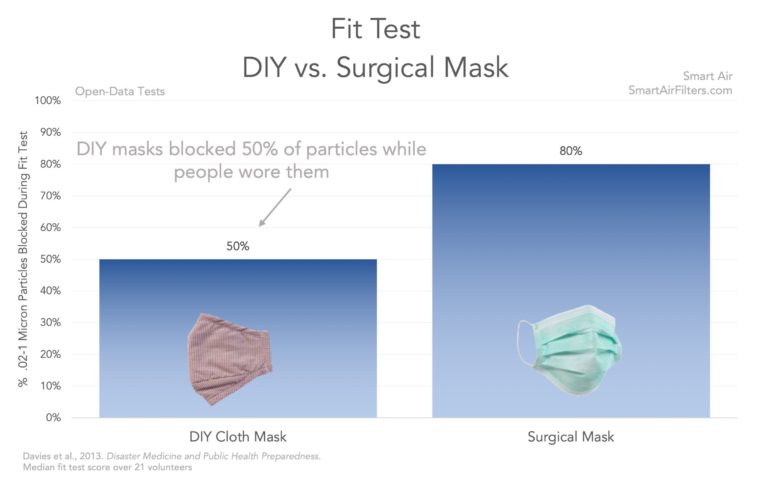
In another study done in the Netherlands, researchers evaluated the performance of dish cloth masks, surgical masks, and N95 respirators against particles 20-1000 nm in diameter. This study also compared the effectiveness of these masks in adults vs. children. They were less effective on children which may indicate poorer fit on children’s faces.
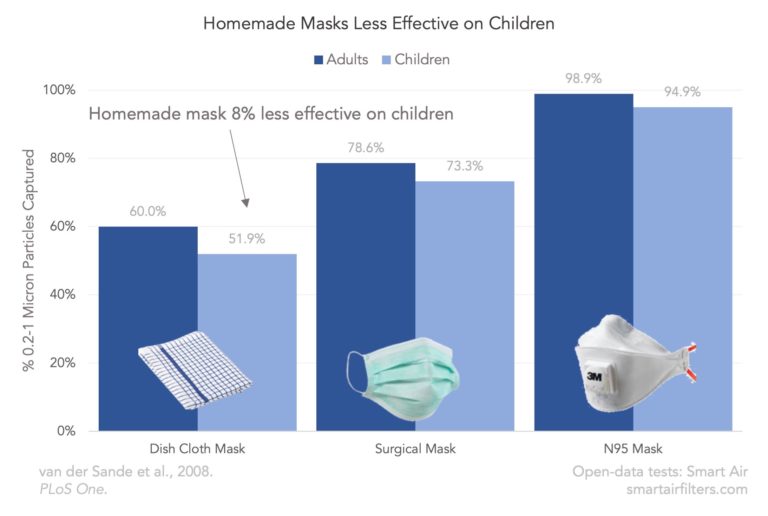
Conclusion
In summary, despite some of the conflicting information out there - masks are a very effective way to prevent COVID-19 infection. While some sources claim that only N95 respirators are helpful at preventing the inhalation of virus particles, the scientific data demonstrates that may not be entirely true. Surgical masks and even cloth masks can significantly decrease the amount of tiny particles in the air that is inhaled and potentially stop COVID-19 from spreading.
A special acknowledgement to www.smartairfilters.com for some of the data compiled in this posting.
Recent Posts
-
Disinfecting Surfaces in the Era of Covid and EPA Registered Commercial Disinfectants and Viricides
The disinfection of surfaces at home, in public spaces, and in hospitals and clinics needs to be a …15th Jan 2023 -
Working with Inorganic Acids in the Laboratory: A Practical Guide
Working with Inorganic Acids in the Laboratory Acids are of great importance in the laboratory and a …5th Jan 2023 -
The Top 12 Drinking Water Contaminants
1.Lead- from older plumbing systems pre-1986, when lead pipes, solder, and components were banned. …14th Dec 2022

